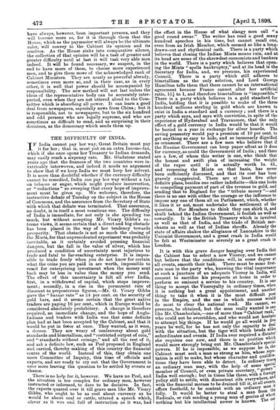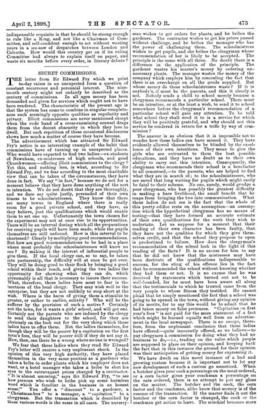THE DIFFICULTY OF INDIA.
IF India cannot pay her way, Great Britain must pay it for her ; that is, must put on an extra Income-tax, which if she once opens her Treasury to Indian demands, may easily reach a sixpenny rate. Mr. Gladstone stated years ago that the finances of the two countries were in- extricably interwoven, and indeed it needs no argument to show that if we keep India we must keep her solvent. It is more than doubtful whether if the currency difficulty cannot be remedied, India can pay her way without a tax on tobacco or sugar, which might produce insurrection, or " reductions " so sweeping that every hope of improve- ment must be given up. We welcome, therefore, the instructive debate of Tuesday on the subject in the House of Commons, and the assurance from the Secretary of State with which that debate was terminated. That assurance, no doubt, is in itself a most vexatious one. The diffioulty of India is immediate, for not only is she spending too much, but without accepting Mr. Vicary Gibbs's ex- treme views, it seems certain that a direct and big obstacle has been placed in the way of her tendency towards prosperity. That obstacle is not so much the closing of the Mints, for that unprecedented experiment was probably inevitable, as it certainly avoided pressing financial dangers, but the fall in the value of silver, which has produced a condition of uncertainty most injurious to trade and fatal to far-reaching enterprise. It is impos- sible to trade freely when you do not know for certain what the coins you are paid in are worth, impossible to remit for enterprising investment when the money sent back may be less in value than the money you send. The effect of this uncertainty is felt all over India, first, in a withdrawal of capital, which stops improve- ment; secondly, in a rise in the permanent rate of discount to preposterous figures,—Mr. G. Vicary Gibbs gave the "bazaar rate" as '24 per cent. on the security of gold bars, and it seems certain that the great native traders are paying 16 per cent., which in Europe would be considered absolutely prohibitory. A change is therefore required, an immediate change, and the hope of Anglo- Indians and traders with India was that some definite plan had at last been accepted by the Cabinet, and that it would be put in force at once. They wanted, as it were, a decree. They are weary of controversy about gold standards and bimetallism, and "restricted output of coin," and "standards without coinage." and all the rest of it, and ask a definite law, such as Peel proposed in England and carried, thereby making of this country the financial centre of the world. Instead of this, they obtain one snore Committee of Inquiry, this time of officials and experts, and are ready to cry out that the Government is once more leaving the question to be settled by events or chance.
There is no help for it, however. We have no Peel, and the situation is too complex for ordinary men, however instructed or informed, to dare to be decisive. In fact, the experts quarrel over it till grave men like Mr. Vicary Gibbs, who ought to be as cool about currency as he would be about coal or cattle, uttered a speech which, -clever as it was and full of instruction as it was, had the effect in the House of what slangy men call "a good round swear." The writer has read a good many hundred speeches in his time, but cannot recall one, even from an Irish Member, which seemed so like a long. drawn-out and rhythmical oath. There is a party which believes that closing the Indian Mints means ruin, and at its head are some of the shrewdest economists and bankers in the world. There is a party which believes that open- ing the Mints "spells bankruptcy," and at its head is the Secretary for India, and, we presume, his experienced Council. There is a party which still adheres to bimetallism as the only solution, and Lord George Hamilton tells them that there cannot be an international agreement because France cannot alter her artificial ratio, 151 to 1, and therefore bimetallism is "impossible." There is a party which believes in a gold standard for India, holding that it is possible to make of the three hundred millions sterling in gold which are known to exist in India a standard and a currency ; and there is a party which says, and says with conviction, in spite of the experience of Hyderabad and Travancore, that the only effect of a gold currency in India would be that it would be buried in a year in exchange for silver hoards. The saving peasantry would pay a premium of 10 per cent. to get anything so easy to hide, and so immensely dignified as ornament. There are a few men who believe that if the Russian Government can keep paper afloat as it does for currency, so could the Government of India; and there are a few, of whom this writer is one, who think that the honest and swift plan of increasing the weight of the rupee until it is actually worth is. 41, and reopening the Mints on that basis, has never been sufficiently discussed, and that its cost has been gravely exaggerated. There are at least five other definite plans, besides one rather indefinite—this one looks to compelling payment of part of the revenue in gold, and sending that to England for the "tribute money "—and there is no one with either the courage or the influence to impose any one of them all on Parliament, which, whether it likes it or not, must undertake the settlement of the question. For Members to think they can shirk it, and skulk behind the Indian Government, is foolish as well as cowardly. It is the British Treasury which is involved as well as that of India, and the trade of British mer- chants as well as that of Indian shroffs. Already the state of affairs shakes the allegiance of Lancashire to the Unionist Government, and a great crash in India would be felt at Westminster as severely as a great crash in London.
It is with this grave danger hanging over India that the Cabinet has to select a new Viceroy, and we cannot but believe that the conditions will, in some degree at all events, smooth their task. There must be some first- rate man in the party who, knowing the -vital importance at such a juncture of an adequate Viceroy in India, will consent to sacrifice his prospects at home in order to perform so eminent a service to his country. It is one thing to accept the Viceroyalty in ordinary times, when it is nothing but a great appointment, and another thing to take it when it is the most difficult post in the Empire, and the one in which success would do most to clear the national road. He cannot, we presume, be obtained, but the man really wanted is one, like Mr. Chamberlain,—one of more than "Cabinet rap); who could not be overridden, and who would not hesitate to attempt big things. If he would go all would in five years be well, for he has not only the capacity to deal with the situation, but the tiger will which bends alike subordinates and events. If India ever required a dictate she requires one now, and there is no position which would more strongly bring out Mr. Chamberlain's srelei powers. If he is impossible, as we suppose he is, the Cabinet must seek a man as strong as him, whose r.ePe' tation is still to make, but whose character and qualifica- tions they have been able to detect. In ordinary tiui.e5 an ordinary man may, with the help of some speciai; member of Council, or even private secretary, govere India well enough ; but in times like these, with a foreie policy still to settle, with discontent rife everywhere, an with the financial morass to be drained till it, at all events) offers foothold, to be content with an ordinary men folly. It would be better to steal a man from th Radicals, or risk sending a young man of genius of who nothinit but his intellectual power is known. The °D indispensable requisite is that he should be strong enough to rule like a King, and not like a Chairman of Com- mittee, and self-confident enough to act without wasting years in a see-saw of despatches between London and Calcutta. How would this country get on if its ruling Committee had always to explain itself on paper, and waste six months before every order, in literary debate ?



































 Previous page
Previous page